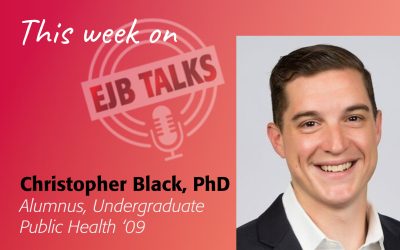In this episode of EJB Talks, Associate Dean Stuart Shapiro speaks with Bloustein School alumnus Storm Ervin MPP ’18. Now an analyst for The Urban Institute in Washington D.C. Ms. Ervin was a central organizer for the protests at the University of Missouri after the murder of Michael Brown in Ferguson MO in 2014. She shares her experiences from the Missouri protests and draws lessons for the current protests going on nationwide over the murder of George Floyd.
Stuart Shapiro
Welcome to another episode of EJB Talks. I’m Stuart Shapiro, the Associate Dean of Faculty at the Bloustein School. And the purpose of this podcast is to talk with my colleagues and our alumni about issues affecting people in New Jersey, the United States, and the world. Over the past week, as I’m sure you know, the country has been roiled by the protests over the murder of George Floyd in Minneapolis, and, the government reaction to those protests. today. I’m very happy to be speaking with Storm Ervin, a former student of ours at Bloustein School and an analyst at The Urban Institute. Storm, thanks for joining us.
Storm Ervin
Thank you for having me, Professor Shapiro. It’s a pleasure to be virtually back after graduating two years ago now.
Stuart Shapiro
Excellent. Well, let me start with letting you talk a little bit about yourself. Can you tell me a little bit about the Urban Institute and about your work?
Storm Ervin
Yes, so Urban is a nonprofit organization in Washington DC we conduct research to elevate the debate. I particularly work in the Justice Policy Center. So my work touches on victimization, victimization for people who cause harm, and who are harmed. And by that I look at programs I look at systems, I look at how stakeholders within the criminal justice system respond to victimization experiences; again, both of those who are harmed and those who cause harm.
Stuart Shapiro
Well, that’s definitely relevant work for where we are right now. Also relevant is that before you joined us at Bloustein, you were a student at the University of Missouri during the protests against racial injustice there. As someone who played a central role when those protests, can you talk about them, what they were about, and the results?
Storm Ervin
Yeah, so before those protests started, in 2014, there was the death of Michael Brown in Ferguson, Missouri. Michael Brown was killed at the hands of police violence. And so at the University of Missouri, two hours away from Ferguson, and a school that has a lot of students who came from that area — from the St. Louis area, myself included — w started participating in protests in Ferguson. We also did protests at the University of Missouri, also known as Mizzou. And that eventually transpired for fighting racial injustice, systematic…sorry, systemic racial injustice that was seen in police practices, to fighting racial injustice that was seen in the University. Because our concern as students were more so rooted in our experiences as students. And so we demanded things such as more black faculty, more mental health clinicians of color, just having someone who we could see ourselves in to guide our academic experience and also be available for mental health treatment as well. So those are some of the things that we were demanding in our fight for racial justice.
Stuart Shapiro
And I mean, they made national news. Eventually, the president of Missouri stepped down, right?
Storm Ervin
Yeah. So there were a few steps along the way…. (laughing)
Stuart Shapiro
(laughing) Yeah, I simplified a little bit.
Storm Ervin
So we go to the protest, and there was an individual who embarked on a hunger strike because that’s how severe racial injustice felt on the campus. And so, it was really hard to go to class, really hard to just sustain, because you know, racial trauma doesn’t just affect you at the university it affects you before you get to the university. And so to have it, here, in the space where you’re coming to learn and to further your career; and for some people mobilize out of the lower class. And that was my experience. To then be met with feelings of not being wanted because of your race. It was hard. And so yeah, one person went on a hunger strike and the entire campus got involved, universities around the country, around the world, got involved. And eventually our football team, a Division I, southern… SEC (laughing) I can’t remember the acronym, but it’s the SEC Division, they decided that they were not going to play until our university president stepped down. And so the combination of all those things — student protests, the hunger strike, other universities being in solidarity, and the football team stepping down, caused the university president to resign.
Stuart Shapiro
Yeah, I remember reading about that. And it was really, really something else there. I’d be interested in, both given your professional research and your personal experience, in your perspective and your reaction to the protests over the past week.
Storm Ervin
Yeah, so I just want to say that all opinions are my own and I do not represent The Urban Institute when I present them.
Stuart Shapiro
Absolutely.
Storm Ervin
Yeah, so the protests of the past week–and this may be odd, but–they left me with hope. While I’m not a fan of how they came about, obviously, we don’t need to see anymore black or brown or anyone victimized by the hands of white supremacy. And I say anyone because I saw a video last night and it showed that there’s literally anyone can become a victim of violence, especially….
Stuart Shapiro
Because of the Buffalo video last night.
Storm Ervin
Yeah. And honestly–this is not related, but–I chose to not watch the Ahmaud Arbery and the George Floyd videos. I know how they end. I have seen enough racial trauma in my life. I don’t want to see it again. But with the video last night in Buffalo, there was no trigger warning. And so I had to see it and I was really upset by it. But it also just illuminated that, anyone is capable of being a victim of state-sanctioned violence.
So in my personal life, I see there is hope because when you think back to 2014, 2015 when we saw Ferguson, a movement had already been in motion and it kind of got bigger with Ferguson. And then you saw people were uprising and resisting violence in Baltimore, almost everywhere. But now it’s like that energy is revamped. And it’s even bigger. There have been protests in all 50 states. And so what also is hopeful about is that while the cases that got us here were the death of Ahmaud Arbery, Breonna Taylor, and George Floyd, all black individuals, everyone’s resisting. Because I think at this point, we’re all just a little bit overwhelmed with it. We’re all tired of it and to be in solidarity, and to see such solidarity to me, gives me a sense of hope that, this is no longer just a black issue. While, yes, it is predominately a black issue, everyone is rallying behind it. And so for me, I am hopeful that it can continue.
Stuart Shapiro
One thing that’s really struck me particularly over the last couple days — and you mentioned the Buffalo video — but that’s only one of many, many videos that have circulated online and on social media, of police reaction to the protests. And of course, you’re in Washington DC. So you’re experiencing this to some degree very, very close at hand here. But my perception is that we haven’t seen this much on video, widely shared around. You know, it’s been sort of instance by instance, separated by a little bit of time. And now we have a week with hundreds of videos circulating of police reacting to protests in violent ways. And it strikes me that might make a difference in a way that the individual incidents didn’t before.
Storm Ervin
Yeah. I agree. And I think part of that is… so I think we’re all learning some of our biases, and who we see as victims and who we see as worthy of not being targeted by police. And so, I think what we’re seeing with the protests, and how police responding, again, when black people said it earlier, it’s like, okay, this was our experience. But now again, this experience isn’t just ours. It’s not just that of black people. It’s also the experience of everyone who’s resisting. Right now people out in certain areas that use protests, the pepper spray isn’t looking for one race of individual. The rubber bullet isn’t saying, oh, I’m going to strike when I find that black person. It’s anyone who’s protesting. And so, everyone’s Constitutional First Amendment right is at stake right now. And so, people see themselves and the resistance and .. like, I agree with you that, it is striking that now there’s more and more momentum but sometimes it just takes education. Sometimes it just takes time. Nobody really wants to hear “incremental changes.” I am nobody, I don’t want to hear “incremental changes,” but that’s what we’ve seen. And so, hopefully, the changes can be less incremental. Because again, we have more people behind this.
Stuart Shapiro
Are there any questions from your experience in the Missouri protests that you think should be shared?
Storm Ervin
Yeah. It’s okay to be brave. It’s not easy. And I think protesting right now is normalized…not normalized, it’s not normal. I think in a typical June, you probably want to find a beach or a pool or some outdoor activity that doesn’t include yelling at police. But it’s definitely more common. And so I just want to encourage people that, to continue to be brave. And to continue to speak out, because I think that’s something, a really important message for allies. To be a person who’s normally affected by racial trauma, in their everyday life, it can become exhausting. And because of racism, your voice can fall on deaf ears, depending on who you’re talking to. And so, for allies to step in and continue to be brave and to continue to use their privilege to elevate messages of racial injustice, and how we as a society can change. Continue to be brave, would be my lesson learned because it took a lot for me as a student with as much at risk to do that. And so, yeah, that’s my lesson.
Stuart Shapiro
Yeah, I know, I think that’s really important. And that’s a lesson that all of us, regardless of age or experience, could use learning. You know, I’m a policy person at heart. What policy changes, incremental or more than incremental, do you think we really need to address the racial policing issues that have been at the heart of these protests?
Storm Ervin
Yeah, I think we need to look at what……we need to look at communities where we see a lot overtly policing happening, and look at why that’s happening. Why do we see police more prevalent in certain neighborhoods and among certain populations of individuals? And I would, I’m sure you can find research to say that, these are typically underresourced areas. And if you look at Baltimore, you look at Ferguson. there’s not a lot of public investment. There’s not a lot of community investment. And what you do have is really hard to sustain. And so, the policy change will be around budgetary issues. How can we redistribute wealth? How can we take taxpayer dollars and put them into communities where there is more need?
We saw recently in Los Angeles that the mayor took $100 million dollars, $100, $150 million from the LAPD budget to particularly invest in communities of color. Now, I want to say that wasn’t a large portion of LAPD’s, the Los Angeles Police Department’s budget, but it was something that could now be put into funding after-school programs, that could be put into funding mental health services for people who may not have health care. That can be put into funding domestic violence, housing, long-term housing, because a lot of times for things like domestic violence, you get short-term housing to respond to that crisis situation. And you may have, even if it’s six months down the line or one year down the line, guaranteed housing for anyone is something that would be a great investment. You know, reducing the risk factors for crime, using public resources that makes sense. So I would say that’s my number one policy recommendation as Storm Urban, no other title (laughing).
Stuart Shapiro
(laughing) Yeah, it’s funny. It’s many of those same recommendations, we had a podcast on racial disparities and COVID-19 a few weeks ago, and it’s a lot of the same stuff. A lot of the things that put neighborhoods at risk of crime are the same things that put them at health risk. And so, it really very much aligns with that. What would you need to see over the next few months to know that the protests are moving us in that direction, on policing? On racial justice, on public investment, or any of the areas you think we need to be moving on? What are the benchmarks we can look for to say, oh, you know, this is happening, we’re moving in the right direction.
Storm Ervin
State and local public budgets. So, I know this is budget season, and I’m not sure where every state stands–thank you to Professor Coleman, who allowed me to dig into Delaware when I was in his class– but I know there’s always a lot of conversation in state and local government around how are we going to invest the taxpayer dollars that we’ve collected? So if we could continue to see mayors take the brave step that the Los Angeles Mayor Garcetti….
Stuart Shapiro
Garcetti, yes.
Storm Ervin
Yes. Taking those brave steps. Again, that’s an incremental change because $100 million to $150 million out of a $3 billion budget isn’t that much, but it is something that now communities have more of to use at their disposal. So I think seeing that over time in different jurisdictions, especially jurisdictions that have predominantly people of color, predominantly poor people of color; if we can see that type of brave leadership moving forward, that to me would be an indicator that this, you know, response that we have right now at this moment can be sustained.
Stuart Shapiro
Yeah, I know, I mean, you know, people who obsessively follow the federal government, like myself, know that we’re not going to see anything from Congress at least in the near term. So, I think you’re right, looking to the states and localities, and particularly looking to where they put their money, is probably a, what we can hope for in terms of an indication that things are improving. Is there anything else from your experience, from your research, that you’d like to share?
Storm Ervin
From my research? I can, not necessarily, but from my experience, yes, I want to say to anyone listening, that I am in full solidarity with peaceful protesters. I myself have not gone out to protest the way I would have maybe five years ago. We are still in the middle of a pandemic and I will be around vulnerable populations so I’m keeping that in mind. And for people who are taking their risk and who know they won’t put other people at harm because they get to go home and not be around vulnerable populations, I am in full solidarity. I want to encourage people to move forward even once the protests stop. Maybe the people who killed George Floyd, maybe they do get a conviction. But this is a part of a larger issue. This isn’t … what happened to George Floyd is abominable. It’s not the end. We shouldn’t see another George Floyd; we shouldn’t see another Breonna Taylor; we shouldn’t see another Tony McDade. And so, what we should see are the communities that Tony McDade came from, or the communities that George Floyd came from, supplied with public resources. Supplied with education. Less first-generation college students, because they are being educated by… because their parents have received an education. I say that as a first-generation college student myself, so that… yeah, from my personal experience that would be it.
Stuart Shapiro
That’s, that’s great. Well, you know, Storm took two classes with me, and I hope she learned nearly as much as we all learned from her today. Thanks so much for coming on.
Storm Ervin
Again, thank you for having me.
Stuart Shapiro
Also, a big thank you to our production team, Tamara Swedberg, Amy Cobb and Karyn Olsen. We’ll be back either later this week or early next week with another talk from another expert from the Bloustein School. Stay safe.




